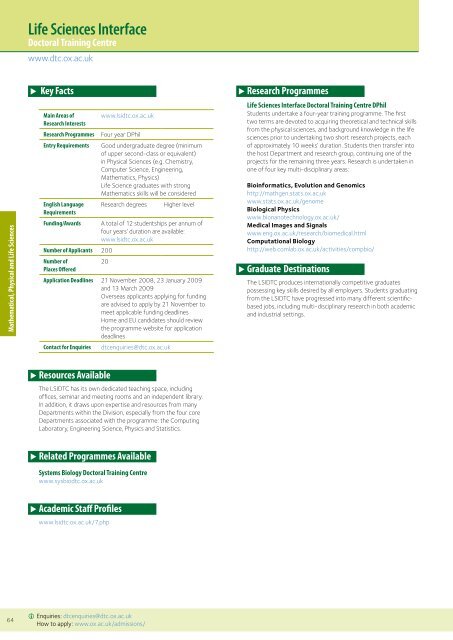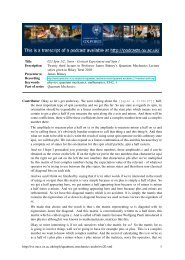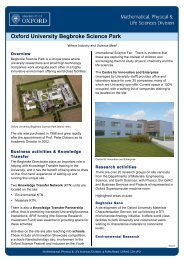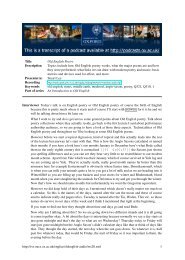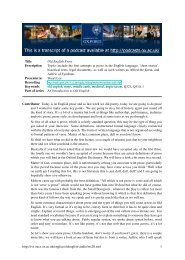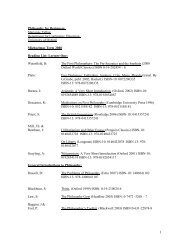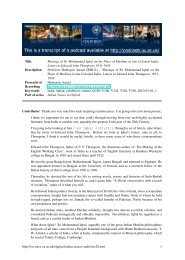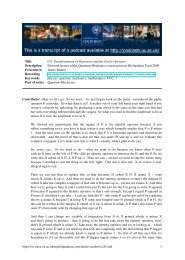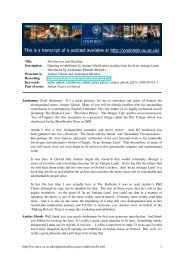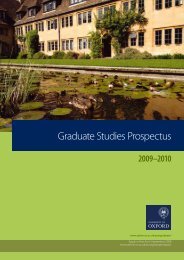Graduate Studies Prospectus - University of Oxford
Graduate Studies Prospectus - University of Oxford
Graduate Studies Prospectus - University of Oxford
You also want an ePaper? Increase the reach of your titles
YUMPU automatically turns print PDFs into web optimized ePapers that Google loves.
Life Sciences InterfaceDoctoral Training Centrewww.dtc.ox.ac.ukMathematical, Physical and Life Sciencesϐϐ Key FactsMain Areas <strong>of</strong>Research InterestsResearch ProgrammesEntry RequirementsEnglish LanguageRequirementsFunding/Awardswww.lsidtc.ox.ac.ukFour year DPhilGood undergraduate degree (minimum<strong>of</strong> upper second-class or equivalent)in Physical Sciences (e.g. Chemistry,Computer Science, Engineering,Mathematics, Physics)Life Science graduates with strongMathematics skills will be consideredResearch degrees Higher levelA total <strong>of</strong> 12 studentships per annum <strong>of</strong>four years’ duration are available:www.lsidtc.ox.ac.ukNumber <strong>of</strong> Applicants 200Number <strong>of</strong>20Places OfferedApplication Deadlines 21 November 2008, 23 January 2009and 13 March 2009Overseas applicants applying for fundingare advised to apply by 21 November tomeet applicable funding deadlinesHome and EU candidates should reviewthe programme website for applicationdeadlinesContact for Enquiries dtcenquiries@dtc.ox.ac.ukϐϐResearch ProgrammesLife Sciences Interface Doctoral Training Centre DPhilStudents undertake a four-year training programme. The firsttwo terms are devoted to acquiring theoretical and technical skillsfrom the physical sciences, and background knowledge in the lifesciences prior to undertaking two short research projects, each<strong>of</strong> approximately 10 weeks’ duration. Students then transfer intothe host Department and research group, continuing one <strong>of</strong> theprojects for the remaining three years. Research is undertaken inone <strong>of</strong> four key multi-disciplinary areas:Bioinformatics, Evolution and Genomicshttp://mathgen.stats.ox.ac.ukwww.stats.ox.ac.uk/genomeBiological Physicswww.bionanotechnology.ox.ac.uk/Medical Images and Signalswww.eng.ox.ac.uk/research/biomedical.htmlComputational Biologyhttp://web.comlab.ox.ac.uk/activities/compbio/ϐ ϐ<strong>Graduate</strong> DestinationsThe LSIDTC produces internationally competitive graduatespossessing key skills desired by all employers. Students graduatingfrom the LSIDTC have progressed into many different scientificbasedjobs, including multi-disciplinary research in both academicand industrial settings.ϐϐResources AvailableThe LSIDTC has its own dedicated teaching space, including<strong>of</strong>fices, seminar and meeting rooms and an independent library.In addition, it draws upon expertise and resources from manyDepartments within the Division, especially from the four coreDepartments associated with the programme: the ComputingLaboratory, Engineering Science, Physics and Statistics.ϐϐRelated Programmes AvailableSystems Biology Doctoral Training Centrewww.sysbiodtc.ox.ac.ukϐϐAcademic Staff Pr<strong>of</strong>ileswww.lsidtc.ox.ac.uk/7.php64LLEnquiries:dtcenquiries@dtc.ox.ac.ukHow to apply: www.ox.ac.uk/admissions/


